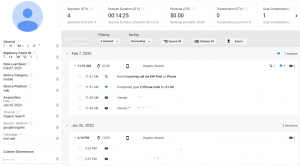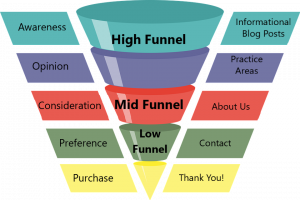There’s no doubt about it, we’re all having to change our daily routines because of COVID-19. Many law firms are finding themselves with more downtime than they’re used to, and that can be very scary as a small business owner.
We’ve been talking to our clients a lot lately about whether they should be pausing all advertising, switching focus on their current marketing projects, and even helping them learn new tools and technology to help them work remotely.
Since no one knows when things will start going back to normal, here’s a list of things you, as an attorney or an employee at a law firm, can do to help your business for the long-haul:
- Write New Content: You know that content you’ve been meaning to write over the past six months, or even six years? Now is a great time to revisit that list and start churning out your new practice types or sub categories. If you have the flexibility to add new practice types that might help your business now (think bankruptcy, divorce, wills & trusts), create content on those and add them to your website.
- Audit Your Site: Not sure if you need new content? Take a look at what you have on your website. If you’ve been in business for a while, there’s a good chance you have some outdated or irrelevant content on your site. Figure out what’s most important to your business and what you want your potential clients to be able to find, or not find.
- Audit Your Own Intake Process: If you’ve utilized CallRail’s recording capabilities, now is a great time to go back and listen to how your staff handles your inbound calls. If you don’t record calls, go through your front desk’s process or list of questions they use to qualify a new lead. Are there things missing from the list? Things that could be added?
- Work on Your Social Media Presence: With so many people at home and on their computers, you should come up with other ways to get in front of people. While social sites may not be the best converting marketing channel, it does help with your local brand exposure. It’s also a great way to build trust with members of your community. We’ve already seen a lot of really great stories come out over the past couple of weeks of local businesses helping their community through these hard times.
- Get Involved: If you’re able, use your legal expertise to help those who have legal questions. If you’re an employment attorney, many people are unsure if they qualify for unemployment. Even if you can’t help the person now, they may need your services in the future and will turn to you.
- Go Digital: For those of you still using snail mail and handwritten documents, switch over to something like DocuSign. Move all of your files off of your hard drive and on to the cloud. You can also embrace video conferencing and invest in a good webcam and microphone.
- Email Campaigns: Use that long list of emails you have from people filling out your website’s contact form and create drip email campaigns to hit people now while they’re doing research on potential lawyers.
- Create a Marketing Plan: For some, marketing is one of the last things you think about when it come to your business. Think about where you’d like to be in the next year, 5 years, or 10 years, and start planning what you need to do to get there. There’s also a lot of really great blog content out there that’s designed specifically for lawyers and their marketing…hint, hint.
- Watch Webinars: Use this time to learn something that can help your business later on. There are plenty of tools and marketing agencies putting on more webinars than normal.
- Attend a Virtual Conference: A lot of conferences have had to move to a virtual platform, including ours, but are still covering the same topics they would have at their physical events. Instead of paying a couple thousand dollars to attend a conference far away, spend a few hundred to get the same great information, but from the comfort of your own home.
Even though things are uncertain at the moment, you can use this time to do all the things you never had time to do before, and set yourself up for success once everything blows over.
If you’re interested in getting an experts opinion on how you should be handling your law firm’s business and marketing, give us a call.








